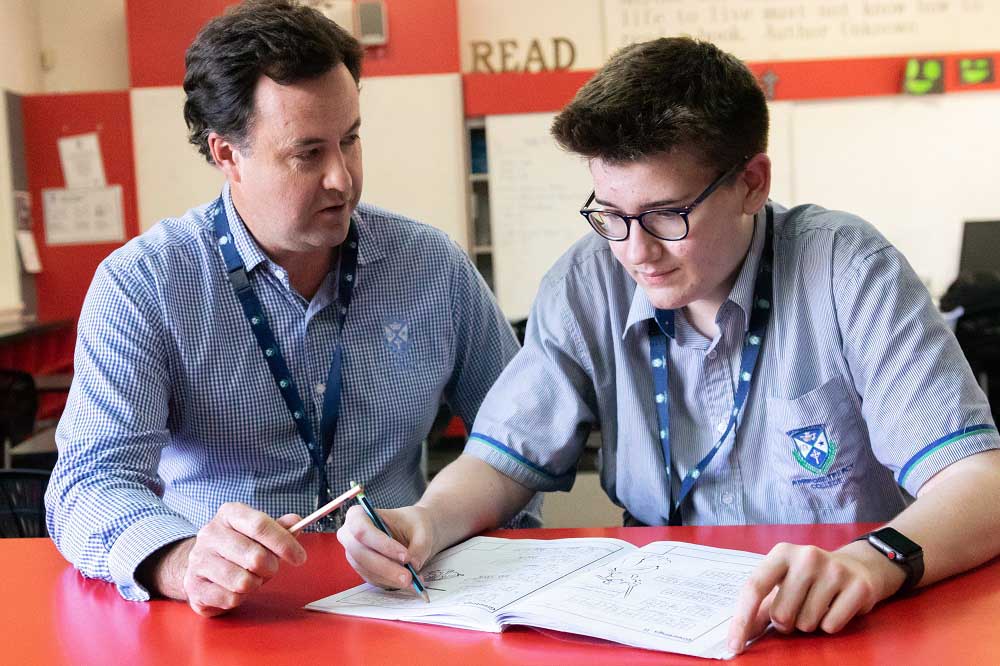
A prevalent ethos among Catholic educators is that young people be encouraged to recognise life’s dualities and acknowledge that when given a choice, they should respond in a way that makes the world a better place.
However, while adolescents in Catholic schools are often quick to identify these dualities, they don’t always possess the insight to see the massively positive impact that their future self is capable of having in society.
Keith Halpin, who is the Senior School Counsellor at Ambrose Treacy College in Queensland, is one Catholic educator who has been working hard to instil these powerful insights into his students.
In 2019, Halpin was a recipient of the NGS Super Scholarship Award, which allows teachers to embark on a professional development initiative of their choice.
Included in this are a range of professional development courses focused on enriching student wellbeing, upskilling in vital areas of learning, innovating student workspaces and forging connections with overseas schools.
Earlier this year, Halpin was to fly to Samoa to continue his work of “teaching through a lens of compassion and justice for all and creating a hope-filled future for students”.
Despite his trip being postponed due to the outbreak of the COVID-19 virus, Halpin still has big plans to foster connections between teachers and students to encourage greater self-awareness.
For Halpin, an important part of this noble goal is identifying opportunities to be compassionate beyond school, which he said can be very difficult for an adolescent.
“Many students leave school feeling energised to continue their engagement in advocacy and service/solidarity learning,” Halpin told The Educator.
“I have specifically selected the word learning largely because it encompasses two pivotal aspects of advocacy”.
The first, says Halpin is when students learn that irrespective of what their chosen pathway may be beyond school, whether it is becoming a tradesperson, a doctor, an accountant or small business owner, they can use their skills to make the world a better place for all.
“In addition to this, the second key aspect to this learning is, if students develop self-awareness on what fosters positive emotional nutrition within them to genuinely live their life, rather than just exist in our complex world; injustice can be more easily understood,” he explained.
“For example: if I can identify that I need to attend to my primary needs of safety, security, shelter, clean water etc…then it easy to see how others in our world need these too”.
Halpin said a robust service learning or immersion program within school can support students to develop a greater sense of themselves and how they can make the world a better place for all.
An example of this is Ambrose Treacy College’s Service Program, which provides Year 11 students an opportunity to experience a different culture, be challenged outside of their comfort zone, learn from a different community, and to serve communities in a different cultural setting.
The program provides staff and students at the school the opportunity to stand in solidarity, and build positive, respectful relationships with people of different cultures and creeds.
‘Relational connections have become diluted’
Halpin said that over time, schools have become “incredibly complex and extremely busy organisms”.
“Teachers are often required to not only teach their subject, but for some students, their teacher must take on a role as a mentor, counsellor, coach, mother or big brother all the while maintaining appropriate professional boundaries,” he said.
“In my opinion within our data-driven response to student needs, the traditional relational connection between student and teacher has become diluted”.
Halpin said that in response to this, creating a specific time whereby emotional needs can be attended to may only come outside of the traditional teaching day.
“There is real beauty when a student is completely energised by subject content. However, this beauty is most frequently fostered by a passionate teacher who invests in not only the subject, but each student in their care,” he said.
“Providing opportunities for teachers and students to connect, within a supportive environment, can promote a greater understanding and tolerance between the two”.


